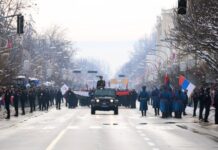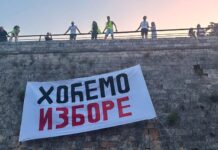©Tjeerd Royaards (The Netherlands) – Cartoon Movement
“Youth are the leaders of tomorrow,” or so they are often told by today’s leaders. Yet, paradoxically, these very leaders seem to deny young people access to political literacy and foundational knowledge about politics. What could be more crucial for the future – and indeed the present – of any society than ensuring its most vibrant generations understand the events that shape their daily lives, well-being, and societal structures? Likely, very little.
In Kosovo, however, the picture is troubling. Despite forming a significant portion of the population, young people show limited interest in politics: only 19.3% deem it important, and a mere 2% feel represented by political institutions in their homeland. These figures are alarming not only because of their scale, but because they expose a stark disconnect between the political rhetoric and actual engagement with youth.
Politicians frequently tout young people as the nation’s future, especially during election campaigns. Yet their actions rarely reflect this sentiment. Instead, we see a deepening discrepancy between these grand declarations and the tangible opportunities offered to youth for political participation and decision-making.
Worse still, more than half of Kosovo’s youth adopt a passive – or even apathetic – stance toward national and global developments. Political events are viewed superficially, despite the fact that these are the very dynamics that shape their rights, freedoms, and future prospects. This superficial engagement is not just unfortunate, it’s dangerous.
A self-perpetuating cycle emerges: the lack of political awareness today fosters generations who are poorly equipped to make informed decisions tomorrow. These decisions are not abstract, they directly affect health care, education, employment, civil rights, and more. At the heart of this issue lies a failure to instill the basic principles of democracy through education.
Kosovo’s school system is failing in this regard. In both primary and secondary education, students receive minimal exposure to political concepts. The lone subject aimed at fostering civic understanding – “Civic Education” – is insufficient in both scope and quality. Taught for only a limited time, with outdated textbooks and imprecise content, it leaves students without even a foundational grasp of political processes. Many report only learning essential political knowledge after the age of 18, through social media or television.
Although youth voter turnout in Kosovo is relatively strong, this should not be mistaken for political literacy. Voting alone does not reflect deep understanding or meaningful engagement. Few young people are active in political parties, fewer than 10% to be specific, and many of those who do engage do so for job prospects tied to political loyalty. This practice discourages independent participation and reinforces a culture of disillusionment.
Protest participation reveals another dimension of this disillusionment. Large youth mobilizations are typically reactive, such as protests in response to femicide, while engagement on broader policy issues remains low. Political discussions are often limited to civil society and a small group of independent activists, leaving the majority of youth disengaged.
Conversely, the term “disinformation” has gained traction in Kosovo’s public discourse, used frequently by both media outlets and NGOs. Media literacy is rightly identified as a solution, but an even more effective response lies in strengthening political literacy. When asked, most young people admitted they had rarely used the term before, but by the end of the conversation, they unanimously agreed that political education is a critical tool for combating disinformation and fake news.
Legally, young people are not barred from political participation. Kosovo’s constitution allows full political activism for youth. The main political party, Vetëvendosje, includes an unusually high number of young members, and individuals like former Prime Minister Hashim Thaçi (appointed at 31), current Prime Minister Albin Kurti (politically active since his student years), and President Vjosa Osmani (appointed at 39) exemplify youth participation at high levels. Still, these examples are exceptions. There remains a significant gap in broader youth representation within Parliament and national policymaking structures.
Historically, however, Kosovo’s youth have been central to social and political movements, from student-led demonstrations against the Milošević regime in the 1990s to more recent protests against sexual harassment in universities. A new generation of activists aged 18 to 33 continues this legacy, making vital contributions and serving as role models for civic engagement.
It is time for Kosovo’s youth to stop accepting the passive label of being “the future” and start claiming their rightful role in shaping the present. Active citizenship begins with being informed. Reforming the education curriculum to prioritize civic and political education is essential, not only to promote engagement but also to protect against misinformation and manipulation.
As John Adams once said, “Liberty cannot be preserved without a general knowledge among the people, who have a right and a desire to know.” The recent youth-led protests in Belgrade are a powerful reminder that change is possible when young people are informed and engaged. We don’t just represent the possibility of change – we are that change.
Hanmie Lohaj














